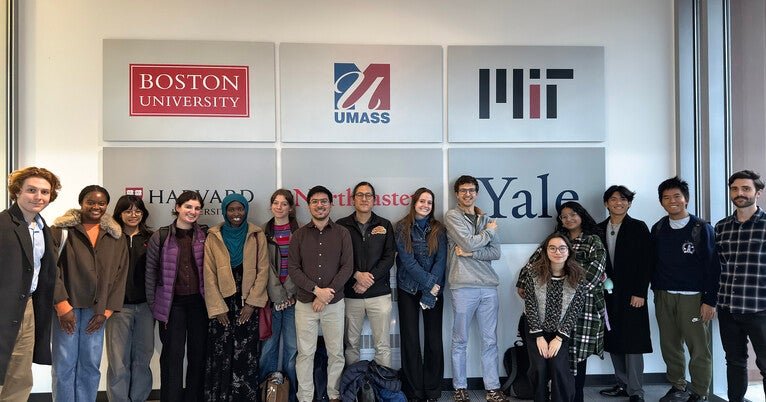On a recent afternoon at the Massachusetts Green High Performance Computing Center (MGHPCC), James Culbert, the center’s director of IT services, led a group of Yale students down long halls with polished concrete floors to explore the guts of the facility — the humming electrical room, the pump room full of cooling equipment, the miles of yellow fiber-optic cables.
They then headed upstairs, where students helped themselves to ear plugs heaped in a bin on the wall before entering the center’s pulsing heart: a room filled with row after row of tall black computer cabinets. The roar from the cooling systems used to maintain an adequate temperature was so loud that Culbert had to shout to be heard. The group filed past one row of cabinets after another, many with university logos on their doors, until he reached row 11: the computing domain of Yale, which is a partner in the facility.
For Elizabeth Schaefer, a senior from Houston with a double major in computer science and the humanities, the tour was an eye-opening look at the engineering challenges associated with maintaining a massive computing facility. And it revealed the physical reality behind the work she does as a researcher in the Yale NLP Lab, which taps into those high-performance computers for its study of artificial intelligence.
“Stepping into that computer room, feeling the heat radiating off the racks, and hearing the deafening roar of the cooling systems was an immediate reminder that our ‘virtual’ work is grounded in massive, very real infrastructure,” she said.
And that is precisely the point of this new undergraduate course, “Topics in Critical Computing,” which is co-taught by Theodore Kim, a professor of computer science in the Yale School of Engineering & Applied Science, and Julián Posada, an assistant professor of American Studies in Yale’s Faculty of Arts and Sciences. The instructors want students to think more deeply and critically about the computing technology that touches nearly every corner of their lives.
“We are looking at computing from a social, humanistic, critical lens, looking at things like power usage, how computing relates to people, how it affects lives and impacts communities, and ways to mitigate those impacts,” said Posada. “What are the limits of the technology? Who was affected by its development? Who will be affected by its deployment? Those are the key questions from this class.”
Beginning next fall, students will have an opportunity to delve even more deeply into these questions by pursuing a Certificate in Computing, Culture, and Society. The new certificate program, co-directed by Kim and Posada, will require students to complete five courses, beginning with the “Topics” course, that come from four different disciplinary areas and connect computing to the wider world.
At Yale, faculty members across the university are conducting research into technology’s role in society and the environmental, human, and ethical challenges posed by computing, but they are scattered across many different departments, the professors said.
“We wanted this certificate to be the first point for students to find courses related to these topics and have one curriculum where they can explore them,” Posada said.











